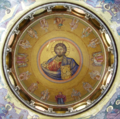Ukrainian Orthodox Church (Moscow Patriarchate): Difference between revisions
Restored well referenced text per talk. Please discuss instead of reverting. |
Revamped the article, amended the lead per talk. |
| (6 intermediate revisions by 3 users not shown) | |
(No difference)
| |
Revision as of 14:38, 28 October 2008
| ||||||||||||||||||
The Ukrainian Orthodox Church (Moscow Patriarchate) (Template:Lang-uk; Template:Lang-ru) is a de-facto autonomous Church of Eastern Orthodoxy in Ukraine, under the ecclesiastic link to the Moscow Patriarchate. The Church refers to istself as simply the Ukrainian Orthodox Church and is one of the two major rival Ukrainian Orthodox Churches (the other being the Ukrainian Orthodox Church - Kiev Patriarchate) and is the only one whose canonical status is recognized by all other major Orthodox Churches worldwide.
Name
The Ukrainian Orthodox Church (MP) insists on its name being just the Ukrainian Orthodox Church,[1] stating that it is the sole canonic body of Orthodox Christians in the country,[1] a Ukrainian "local church" (Template:Lang-uk), a claim fiercely contested by her non-canonic rivals.
The Church is registered under the name "Ukrainian Orthodox Church" in the State Committee of Ukraine in Religious Affairs.[2]
In Ukrainian mass media and in academic literature it is referred to, however, as the Ukrainian Orthodox Church (Moscow Patriarchate) or UOC (MP)[3][4][5] in order to distinguish between the two rival churches contesting the name of the Ukrainian Orthodox Church.
History
Formerly known as Ukrainian exarchate of the Russian Orthodox Church it received a full autonomy (a status one step short of full autocephaly) on October 27, 1990. The Ukrainian Orthodox Church considers itself to be a Ukrainian exarchate of the Moscow Patriarchate as well as the descendant of the Orthodox Church of Kiev and all Rus' in Ukraine, thus claiming a direct lineage to the original Baptism of Rus' by St. Vladimir (Volodymyr) in 988.
The Metropolitan Volodymyr (Viktor Sabodan) is enthroned since 1992 as the head of the UOC under the title Metropolitan of Kiev and all Ukraine.
The church is currently the only Ukrainian church to have canonical standing in Eastern Orthodoxy, and operates in full communion with the other Eastern Orthodox Churches. It also owns the majority of Orthodox church buildings in Ukraine and is predominant in eastern and southern Ukraine.
| Part of a series on |
| Eastern Christianity |
|---|
 |
The official residency of Metropolitan Volodymyr is in Kiev Pechersk Lavra (Monastery of the Caves) in Kiev.
As of 2006 the Ukrainian Orthodox Church had the allegiance of 10 875 registered religious communities in Ukraine (approximately 68 percent of all Orthodox Christian communities in the country), located mostly in central, eastern and southern regions and is the largest religious body in Ukraine. However, this claim is contested by the Ukrainian Orthodox Church - Kiev Patriarchate. Officially UOC claims to have up to 35 million followers [citation needed] . The Ukrainian Orthodox Church's officially views other Orthodox churches of Ukraine to be "schismatic nationalist organizations" whose claims to represent Orthodoxy are canonically invalid.
The Church currently has 42 dioceses, with 58 bishops (diocesan - 42; vicar - 12; retired - 4; with them being classified as: metropolitans - 10; archbishops - 21; or bishops - 26). There is also 8516 priests, and 443 deacons.[6]
Criticism
In 2008, a Russian Orthodox church in Ukraine was accused of fomenting anti-Semitic and anti-Ukrainian propaganda in Kamianets-Podilskyi through leaflets accusing Jews of being behind the masterminds of 1917 Russian Revolution and of 2004 Orange Revolution and also questioning the right of Ukraine to exist as a separate nation-state from Russia.[7]
See also
- History of Christianity in Ukraine
- Ukrainian Orthodox Church - Kiev Patriarchate
- Ukrainian Autocephalous Orthodox Church
References
- ^ a b The interview given by Metropolitan Volodymyr (Viktor Sabodan) to Associated Press
- ^ "On the state and tendencies of expansion of the religious situation in government-church relations in Ukraine". State Committee of Ukraine in Religious Affairs (in Ukrainian). Retrieved 2008-01-12.
- ^ "Politics and Society in Ukraine". Paul J. D'Anieri, Robert S. Kravchuk, Taras Kuzio. Retrieved 2008-10-24.
- ^ "Post-Soviet Political Order". Barnett R. Rubin, Jack L. Snyder. Retrieved 2008-10-24.
- ^ "The Orthodox Church in the History of Russia". Dimitry Pospielovsky. Retrieved 2008-10-24.
- ^ "Statistical data". Ukrainian Orthodox Church (in Ukrainian). Retrieved 2008-01-12.
- ^ Orthodox Church Spreads Antisemitic Propaganda in Kamenets-Podolsky, Ukraine, Union of Councils for Jews in the Former Soviet Union, September 2, 2008
External links
- "orthodox.org.ua". Ukrainian Orthodox Church. Retrieved 2008-01-12.
- "Official site of the Ukrainian Orthodox Church". Ukrayina Pravoslavna (in Russian). Retrieved 2008-01-12.

